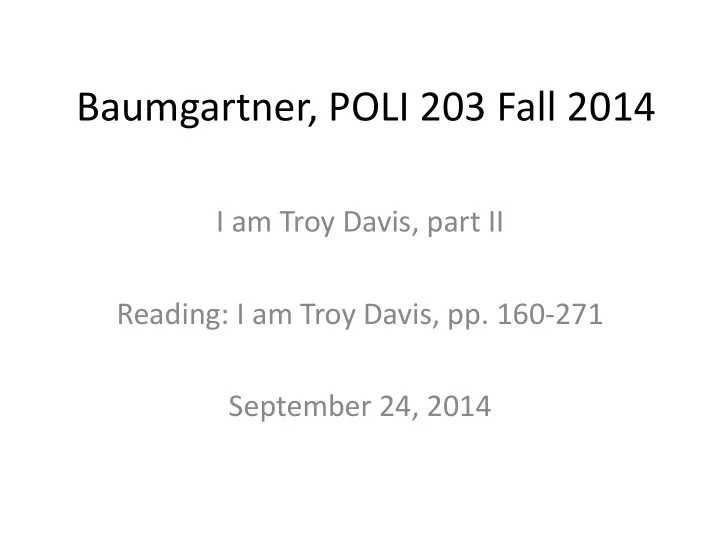

Baumgartner, POLI 203 Fall 2014 I am Troy Davis, part II Reading: I am Troy Davis, pp. 160-271 September 24, 2014
Catching up • Questions about Picking Cotton , Jennifer? • Quizzes – More 10-question quizzes coming, be prepared – Credit for one question in last quiz to all students – Pol Sci is not supposed to be easier than Chemistry: study this stuff, learn it – You will be surprised how much some factual knowledge can come in handy when talking to people, including professors and employers – Quizzes will continue to be factual; papers will be more interpretive
Speakers tonight • Jen Marlowe and Kim Davis • 5:30 in Hamilton 100 (note room change) • 5:00 get there early to get your book autographed if you want • They will also sell t-shirts and books, with the proceeds to a scholarship fund for De’Jaun , who is a sophomore in college at Morehouse • TA’s will have sign -in sheets, make sure you sign in
I Am Troy Davis • Is it / should it be constitutional to: – Keep someone in prison for 22 years before executing them? – Sentence someone to death, then see that 65 percent of the death sentences are overturned? Oops, just kidding. (Not in Troy’s case, however.) – Repeatedly set execution dates, then cancel them? (Troy had 4 dates, only the 4 th one held.) • Do such things amount to torture?
Actually, 22 years is about average
Public Defenders Offices • Troy was represented by the Georgia Resource Center – Their budget cut by US Congress in 1995 (peak of death penalty use in the US) by 70 percent • Difficulty in gaining political support to fund indigent defense services / public defenders offices: why spend taxpayer dollars to defend admitted and convicted murderers? Hard to swallow politically, with predictable results
Pro-Bono Attorneys • Troy, Henry McCollum both represented by a combination of “white - shoe” law firms volunteering their time, and full-time (but often overworked) capital defenders. • NC system a model of reform, but highly unusual; GA more typical in a poorly funded system • How little funding should be too little? You are entitled to an attorney. A good one? One with time to spend on your case? Different questions.
Officer down, but who shot him? • No one wants the crime to be unsolved… • Huge pressure to “close the case” • But quite the chaotic scene and hard to reconstruct exactly what did happen that night in the Burger King parking lot • Danger of wrongful conviction higher when sympathy with the victim is greatest? – Officers, children, other sympathetic victims…
Jury composition • Question came about the racial composition of the jury. My internet search showed: – 8 of 9 preemptory strikes by the DA were directed at Blacks – Still, the final jury consisted of 7 Blacks and 5 Whites
“Otherness” • In death cases, we often see a great effort to make the inmate seem like an animal, someone so “beyond the pale” that you should have no sympathy for them. • Pre-trial release of information, inflammatory media coverage, “ perp- walks” carefully orchestrated. • #iftheygunnedmedown: there are lots of ways to pick a photo
Humanizing • Troy’s family in this book attempts obviously to present him in a different light than the prosecution would. • How frustrating these disputes are – Officer McPhail’s family and others think Troy is a killer – Troy’s family feels he has been unjustly convicted
Attention to Victim or to Inmate? • Increased attention to inmates after they are convicted generally serves to “humanize” them. • But in order to be sentenced to death they often go through a process of being “dehumanized” or “demonized” • Focus on victim and nature of crime, then quickly turn to the accused and say: someone must pay. Henry McCollum was such a case.
Why a Media Storm? Why Troy Davis? • Is his case worse than others? • Was it about timing? • Was it his family’s efforts to generate publicity? • Was it Amnesty International seeking cases? If so, why did they pick this one in particular? • Was it how the case represents outsider’s fears about “rough justice” in the US South? • Was it just random? • Did the media coverage make a difference?
Recommend
More recommend